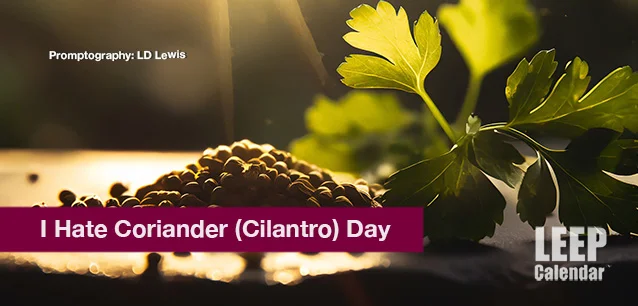 AD
AD
Today is: January 03
Scroll to explore events active on this date.
Additional Events on LEEP
LEEP INK FEATURES

August? Absolutely!
In August, we live through the Dog Days of Summer. It's hot and often humid, and those who can leave for better climates do. Down south, winter is in full force. August is also known as "the ...

In The Heat of July: July 2025 Events
Is it hot enough (or cold enough if you're below the equator) for you yet? There is actually a day for that! Like every month, I pick a diverse collection of events you may or may not know about. This ...

May Blooms: Events in May 2025
Along with October, May is one of the most densely packed months of the year. It's before the summer humidity and the last whole month of the school year. The weather is warming in t...
About I Hate Coriander (Cilantro) Day
Silly , United States
Ends: Feb 24, 2024
DESCRIPTION:
"I Hate Coriander Day," or "I Hate Cilantro Day," is an unofficial event catering to those who strongly dislike the herb. While many culinary traditions worldwide celebrate coriander for its distinct flavor, this day acknowledges and humorously unites those who vehemently oppose it.
Coriander, also known as cilantro in North America, is an aromatic herb with a long history in global cuisine. Its origins can be traced back to ancient times, with references in Sanskrit writings and the Bible. Historically, the Romans and Greeks used it in cooking and medicine. Coriander is unique because its leaves (cilantro) and seeds are used in cooking, offering different flavors and uses.
The herb is widely used in various cuisines across the globe. In Latin American cuisine, cilantro is a staple in salsas, guacamole and a fresh topping for multiple dishes. In Asian cooking, particularly in Thai, Chinese, and Vietnamese cuisines, it's used in soups, curries, and noodle dishes. The seeds, known as coriander seeds, are a vital spice in Indian cooking, used in spice blends such as garam masala and as a seasoning in many dishes.
The reason behind the polarization over coriander's taste is rooted in genetics. For some individuals, the herb tastes like soap due to specific genes affecting their sense of smell and taste. This genetic trait is the basis for establishing "I Hate Coriander Day," serving as a light-hearted platform for those who share this taste perception to express their aversion and find camaraderie.
"I Hate Coriander Day" is marked by humorous social media posts, memes, and merchandise like T-shirts and stickers. It's a day for those who dislike the herb to share their experiences and recipes that deliberately omit it. The celebration is more about camaraderie and humor than aversion.
"I Hate Coriander Day" provides an amusing counterbalance to coriander's widespread culinary use and appreciation. It acknowledges the herb's divisive nature and celebrates individual taste preferences, emphasizing that even in the diverse world of gastronomy, there's room for all opinions, even those in opposition. This event first ran in 2013.
VIDEOS
SUPPORTING DOCUMENTS
Currently, this event does not have supporting documents.
ADDITIONAL IMAGES
Currently, this event does not have supporting images.
Where would you like to go now?
 AD
AD


/footer-logo.svg)
